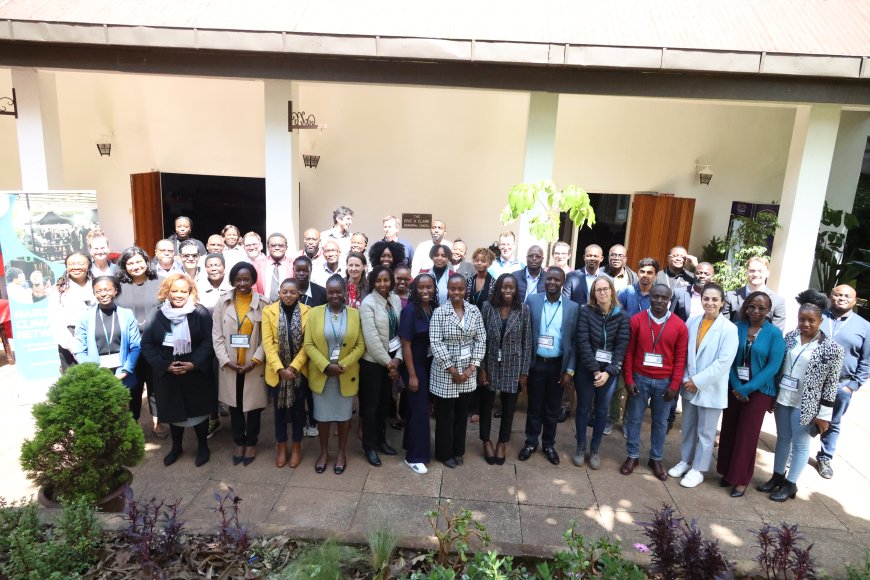NCN’s Carbon Summit - Uniting Industry for Action and Solutions

By Thuku Kariuki and Daniel Furnad
Carbon markets are fast gaining momentum worldwide. Kenya has been at the forefront of African nations, making strides to take advantage of the benefits offered by these innovative markets.
Carbon markets offer a pathway to non-debt, results-based financing that could revolutionize how enterprises engage in climate strategies. A recent World Bank blog stated that "Even though carbon markets alone cannot address the climate challenge in Kenya, we believe that carbon markets, both voluntary and compliance, hold transformational potential for Kenya and can play a pivotal role in enabling enterprises to implement sustainable practices, innovate, and grow."
The Nairobi Climate Network (NCN) has recognized this potential and has taken action to try to bring such benefits to a vast swathe of Kenyan enterprises. The recent NCN Carbon Summit, held in Nairobi at the Brackenhurst Hotel, was one such opportunity for organizations engaging in the carbon market process to share ideas and experiences. Hence, the theme for the Summit: Uniting Industry for Action and Solutions.
Grace Njunge, Associate Partner at Dalberg Advisors Nairobi, emphasized the areas that such actions and solutions can impact.
"Carbon markets have the potential to support Kenya's climate change goals, foster economic growth, and create a positive impact in our communities, and Dalberg is working actively across a range of opportunities, including clean cooking, e-mobility, agriculture and forestry, distributed renewable energy, and more," he noted.
The event covered a wide variety of topics, from regulatory developments to regional engagements, climate impact partners, and the growth potential for Kenya's carbon markets. It featured such sector experts as Katie Hill of Boston Consulting Group, Jake Reynolds of Freshfields Bruckhaus Deringer, and Paul Muthaura of the Africa Carbon Markets Initiatives. They were able to drill down on specifics.
Hill praised Kenya's position as Sub-Saharan Africa's second-largest voluntary carbon credit supplier, with great potential for both carbon avoidance and removal credits. Reynolds, on his end, stressed the vital need for long-term project support, thorough verification, and the integration of internal carbon reductions with voluntary market participation. Muthaura delved into data accessibility and the importance of the formation of the Carbon Markets Association of Kenya (CAMAK).
Héloïse Zimmermann, Co-Founder of the Nairobi Climate Network, expressed the importance of the new Association, saying: "Incubating CAMAK has been a formidable initiative for our network, and it is with great pride that we now hand over the reins to the newly elected leadership. We have laid a strong foundation, and we are confident that CAMAK will continue to drive forward impactful initiatives, fostering an enabling environment for sustainable development and climate action,"
CAMAK held its inaugural Annual General Meeting (AGM) a few days after the NCN Carbon Summit. They expressed their Vision for Kenya to lead in developing an effective carbon market ecosystem that delivers value for people, enterprises, and the planet. They defined the organization's Mission: To unite carbon market practitioners and stakeholders and provide a collective voice for the sector in Kenya.
CAMAK members also set forth a list of objectives that may well define their success. They include engaging the government in the development and implementation of effective and enabling climate policies, promoting high standards of professional ethics and integrity in carbon markets, fostering collaboration, such as the sharing of information and best practices among members, and raising awareness to a broader audience on the nation's carbon market activities.
Mahlon Walo of Afri-Net Carbon was elected the first Chairman of CAMAK. He lauded the synergy between his new organization and NCN, stating, "As the newly appointed Chairman of CAMAK, I am honoured to lead this dynamic association. Our mission, vision, and objectives, along with the establishment of robust operational frameworks, position us to drive meaningful impact. We are grateful to the Nairobi Climate Network for bringing together stakeholders and incubating this important initiative. CAMAK will play a crucial role in fostering collaboration, advocating for supportive policies, and ensuring the growth and integrity of Kenya's carbon markets."
The NCN Summit, for its part, promised to continue tackling a broad spectrum of issues around carbon markets. Breakout sessions addressed enablers, policy actions, and collective steps to accelerate industry growth. Dr. Anne Omambia of Kenya's National Environmental Management Authority explained the country's newly minted carbon regulations.
Christina Nduba-Banja from Bowmans Law discussed the development of the nation's National Greenhouse Gases Inventory, commenting, "We believe that robust legal frameworks and strategic policy development are essential for the success and integrity of carbon markets. As CAMAK takes the lead in this crucial sector, we remain committed to providing the necessary legal support and expertise to ensure that Kenya's carbon markets are transparent, equitable, and effective in addressing climate change."
Reshma Shah, Carbon Markets Lead for British-funded Financial Sector Deepening (FSD), presented the purpose of her organization's participation, "As FSD Africa, we are proud to be one of the founding members of CAMAK and a sponsor of the NCN Carbon Summit. The success, and thereby positive impact of the carbon markets ecosystem, is determined by aligning the requirements and challenges of the key stakeholders and ensuring these are reflected in the enabling regulatory environment, availability of the key skills and services required, including finance, and the effective sharing of benefits."
To thoroughly tap the potential of carbon markets in Kenya, new challenges must be proactively addressed by both businesses and the government. Events like the NCN Carbon Summit allow a free exchange of perspectives that will lead to action and solutions that will benefit so many Kenyans. By supporting organizations like CAMAK, more players will be brought into the carbon market space, creating momentum, fostering expertise, and offering practical ways for the nation to get the most out of its fast start, as well as growing leadership in the climate sector.







